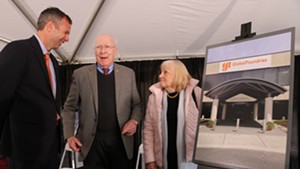
- James Buck
- GlobalFoundries
GlobalFoundries, the Essex Junction-based semiconductor manufacturer, paid a whopping $36 million power bill last year.
"We are an energy hog," acknowledges Greg Rieder, a top manager at the former IBM chip fabrication facility, which has 2,189 workers and is the largest private employer in Vermont.
The sprawling plant, located on a bend in the Winooski River, runs night and day and uses more electricity than the entire city of Burlington — 400,000 megawatt hours per year. GlobalFoundries consumes 8 percent of the power used in the state and 10 percent of the load from its supplier, Green Mountain Power.
So GlobalFoundries is highly sensitive to even slight fluctuations in its electric rates. A penny increase per kilowatt hour can mean millions more in annual operating costs.
The manufacturer pays nearly twice as much for electricity in Vermont as it does in New York State, where it has factories in East Fishkill and Malta. Controlling those costs is crucial to its ability to stay competitive in the cutthroat world of telecommunications chip manufacturing. In addition to its facilities in New York, GlobalFoundries has a factory in Dresden, Germany, and six in Singapore, all of which can produce the kind of chips made in Essex, Rieder said.
"If it doesn't remain competitive, GlobalFoundries won't be investing in this site anymore, and it will be a slow death," he warned.
For years, the company has poured funds into energy efficiency to control its power costs. Now, GlobalFoundries says to thrive in Vermont it needs to reduce costs further by cutting out the middleman.
Last month the chipmaker filed to cut the cord with GMP, the state's largest retail power utility. The company asked the Public Utility Commission for permission to phase out its GMP service and become its own self-managed utility.
The move is a bold bet by GlobalFoundries that it can save money by purchasing power directly from the wholesale energy market, as the company's New York facilities do. Those factories pay 4.6 to 5.5 cents per kilowatt hour, compared to the 9.1 cents that GlobalFoundries pays in Vermont.
Those New York factories closely manage their power purchases. The company has a team of experts engaged in energy trading and hopes to use their specialized skills in Vermont, as well, Rieder said.
"We've done extensive analysis, and we are confident we can do this," he told Seven Days last week. "Otherwise we wouldn't have gone this route."
GMP says it supports the split in part because GlobalFoundries has agreed to pay $16.3 million in fees during a four-year transition to soften the blow to other ratepayers.
This gradual decoupling period presents less risk than if the company were to leave Vermont tomorrow, said Josh Castonguay, GMP's chief innovation officer. In that case, ratepayers could face an instant rate increase of up to 3 percent. That would not only harm ratepayers but would also hurt the state's economy, he said. Once GlobalFoundries goes solo in 2026, GMP says, total average rates are expected to have increased less than half a percent due to the split.
"If we can de-risk things a little bit for our customers while at the same time helping to make the biggest private employer continue to be viable in Vermont, even a little bit, it's worth it," Castonguay, said. "We think it's the responsible thing to do."
Under the current proposal, GlobalFoundries would remain a GMP customer until 2026. The company would pay the utility an annual "transition fee" totaling $15.6 million over the next four years. The chipmaker would also pay $700,000 to compensate other utilities for the increase they'd experience in the shared costs of the state's transmission utility, VELCO.
Without GlobalFoundries as a customer, GMP will spend about $30 million less per year on power, which eases the pain of losing the $36 million yearly revenue from the company, Castonguay explained.
While the rate impact appears limited, Vermont lawmakers were nevertheless taken aback by the proposal when company officials presented it to the Senate Finance Committee in early April. Sen. Mark MacDonald (D-Orange) said the plan struck him as a self-serving move by a corporation that neglected to inform the legislature of its intentions until after it petitioned regulators.
"I'm overwhelmed by the proposal," MacDonald said. "It's obviously been done over two years without our being consulted." MacDonald said the move was similar to failed past efforts by IBM, which sold the plant to GlobalFoundries in 2014, to pick its own power provider.
Sen. Ann Cummings (D-Washington) said members of her committee were "somewhat disturbed" by the plan, in part because of their "pique that no one asked us." Lawmakers don't actually have a say in regulators' decision. They nevertheless worry that the shift might hamper Vermont's ability to green up the state's power mix with more renewable sources.
"I don't think any of us care if there's going to be another utility, as long as it's going to act like all the other utilities," Cummings said.
GlobalFoundries definitely would not do that. If approved, the new utility would be unlike any of the 17 others in the state. Today those range in size from tiny municipal utilities serving just a few hundred customers to GMP, an investor-owned utility with about 266,000 customers serving most of the state. GlobalFoundries would be a rare breed indeed.
"We will only be set up to serve ourselves and no one else," Rieder told lawmakers, who seemed to take little comfort from that fact.
By not having any customers, GlobalFoundries would not be a "retail electricity provider" under state law and therefore would not be required to purchase renewable energy at subsidized rates, as other utilities in the state must.
The utility noted in its filing that 6 percent of GMP's retail electricity cost stems from the requirement that it purchase power from small renewable energy projects, including solar panels on homes. Cutting that cost alone could save the company upwards of $2 million.
Rieder told lawmakers his company is nevertheless committed to reducing its carbon footprint, not just to be a good corporate citizen, but because the market demands it. "Our customers are driving us to produce a product that is carbon free, and you see that happening worldwide now," he said.
During the four-year transition, the company would draft a clean power plan and submit it to the Public Utility Commission for review. How the company could secure a green power supply at a lower cost than GMP is not exactly clear, but it could involve making more power purchases when prices are low, possibly paired with battery storage, Rieder said.
"We are willing to take risks on the short-term market, similar to what we're doing at our other sites, versus buying long-term contracts that are three, four, five years out. That's where we see our savings," he said.
Such predictions ring hollow to Ben Edgerly Walsh, climate and energy program director at the Vermont Public Interest Research Group. His organization hasn't taken a position on the breakup yet, but he told senators the company's claimed exemption from state renewable energy and efficiency programs gives him pause.
Not only would GlobalFoundries not be required to meet the renewable energy mix as other utilities are, it wouldn't have to meet the increasingly stringent carbon reduction goals in state climate plans. Nor would the company be required to continue investing $1 million annually in its own efficiency programs.
"Essentially, what the petition argues is that the State of Vermont should cede energy policy authority for 8 percent of our electricity usage to corporate policy and customer demands of GlobalFoundries," Walsh told senators. "That would be very different policy than what the state has for any other user."
Lawmakers also seemed skeptical that there is any real danger of GlobalFoundries departing Vermont, given the strong worldwide demand for its chips. It's hard for lawmakers to know how seriously to take such threats and therefore how accommodating they should be to businesses looking for special consideration, said Sen. Chris Bray (D-Addison), who wondered whether other major power users might follow suit.
"We're always over a barrel on this question," Bray said.
For much the same reason, Vermont Auditor Doug Hoffer has long been skeptical of state programs meant to reward companies for creating jobs.
In 2019, Hoffer sharply criticized the decision by the Vermont Employment Growth Incentive program to award up to $5.3 million to the Silicon Valley-based company that acquired a GlobalFoundries subsidiary called Avera Semiconductor. He acknowledged there was fear the acquiring company, Marvell, might leave the state but no hard evidence it actually intended to do so. The company maintains a presence in Burlington today.
Joan Goldstein, commissioner of the Department of Economic Development, called it "a simple fact of life" that international businesses such as GlobalFoundries take the cost of operations into account when deciding where to expand.
As the state seeks to grow its workforce, it is "vitally important that we support the retention and growth of business operations and jobs here" to prevent companies such as GlobalFoundries from passing over Vermont for investment or moving out of state entirely, she wrote in an email.
The state has an obligation to work with businesses that find challenges to doing business here to "mitigate the risk of loss of jobs, opportunities, and collective value to the state," Goldstein wrote.
June Tierney, commissioner of the Department of Public Service, assured lawmakers that these and other issues would be thoroughly studied during a lengthy Public Utility Commission process, during which her department would advocate for ratepayers. She noted that utility regulators are required to consider the impact their decisions can have on the economic viability of businesses in the state. "At the end of the day, GlobalFoundries is not obliged to do business in Vermont," Tierney reminded lawmakers. "They can simply choose to leave."
How likely is that? U.S. Senate Majority Leader Chuck Schumer (D-N.Y.) was in Malta, N.Y., on Monday, applauding the announcement that GlobalFoundries' headquarters has moved from California to New York's Capital Region. He stressed the need for passage of a $50 billion federal bill to help chipmakers alleviate the "desperate shortage" of chips worldwide.
Bearing such demands in mind, Sen. Chris Pearson (P/D-Chittenden) reminded Tierney to take a hard look at the company's professed cost burden. Rieder had testified that 85 percent of the world's cellphones contain at least one chip that was made in Vermont, which Pearson interpreted as a sign that the semiconductor business was robust and any flight risk was likely overblown.
"We should at least have some analysis on whether the threat is real," Pearson said.













Comments
Comments are closed.
From 2014-2020, Seven Days allowed readers to comment on all stories posted on our website. While we've appreciated the suggestions and insights, right now Seven Days is prioritizing our core mission — producing high-quality, responsible local journalism — over moderating online debates between readers.
To criticize, correct or praise our reporting, please send us a letter to the editor or send us a tip. We’ll check it out and report the results.
Online comments may return when we have better tech tools for managing them. Thanks for reading.